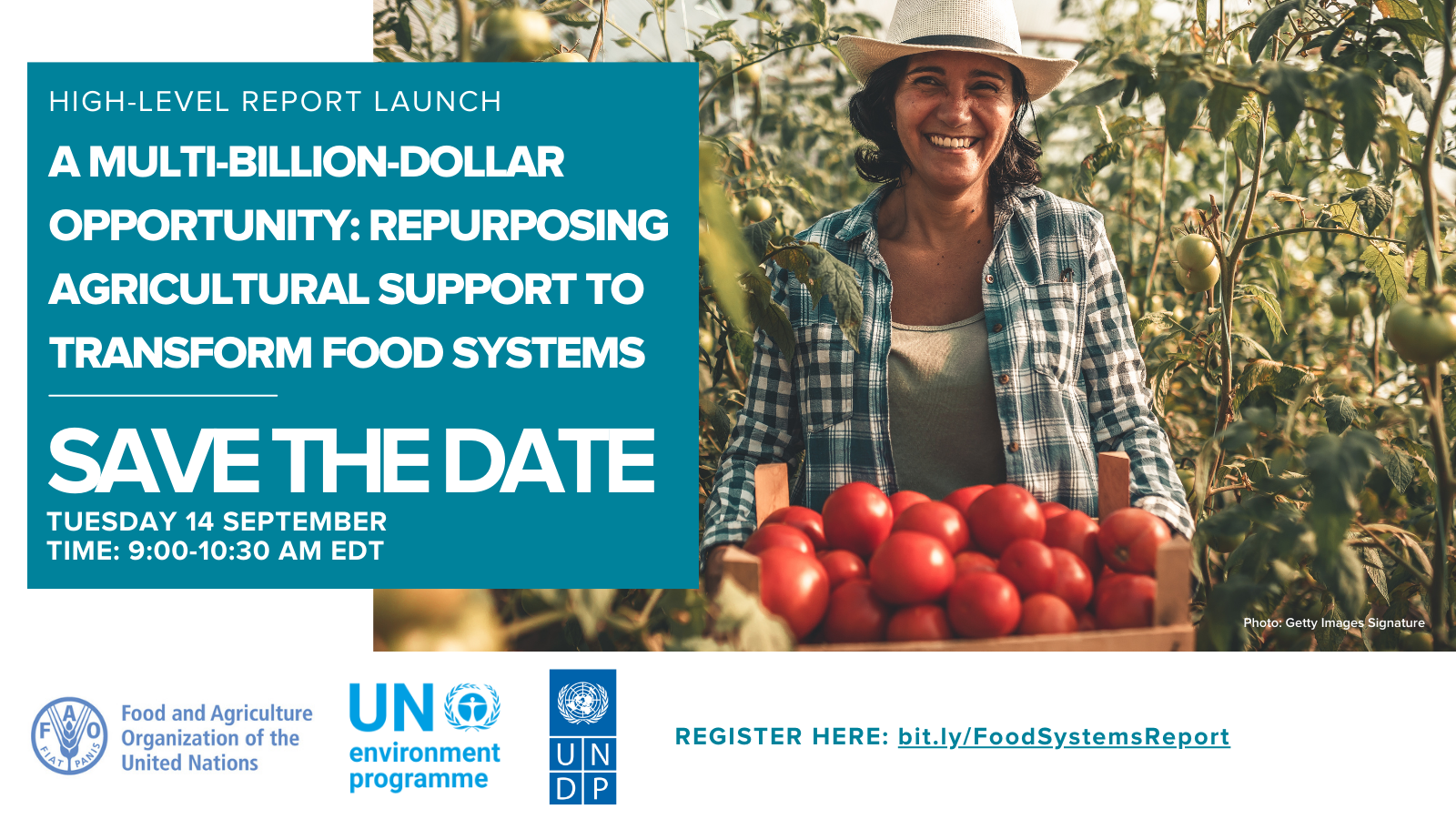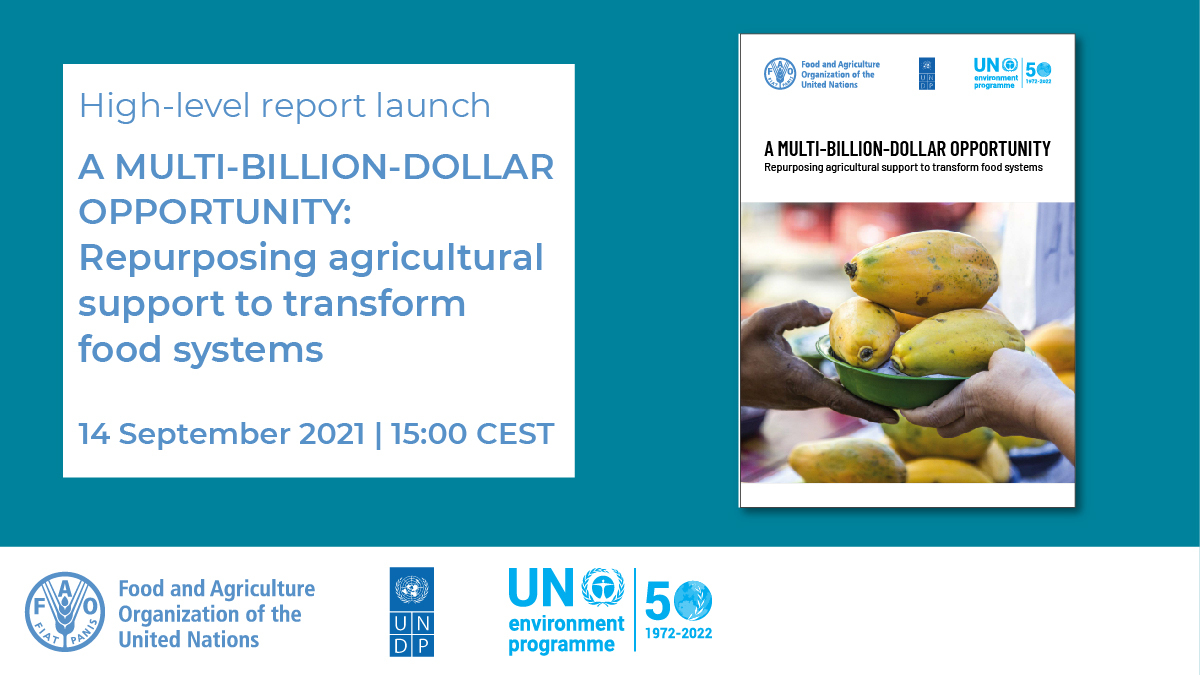Public support mechanisms for agriculture in many cases hinder the transformation towards healthier, more sustainable, equitable, and efficient food systems, thus actively steering us away from meeting the Sustainable Development Goals and targets of the Paris Agreement.This report sets out the compelling case for repurposing harmful agricultural producer support to reverse this situation, by optimizing the use of scarce public resources, strengthening economic recovery from the COVID-19 pandemic, and ultimately driving a food systems transformation that can support global sustainable development commitments.
The report provides policymakers with an updated estimate of past and current agricultural producer support for 88 countries, projected up until 2030. The trends emerging from the analysis are a clear call for action at country, regional and global levels to phase out the most distortive, environmentally and socially harmful support, such as price incentives and coupled subsidies, and redirecting it towards investments in public goods and services for agriculture, such as research and development and infrastructure, as well as decoupled fiscal subsidies.
Overall, the analysis highlights that, while removing and/or reducing harmful agricultural support is necessary, repurposing initiatives that include measures to minimize policy trade-offs will be needed to ensure a beneficial outcome overall. The report confirms that, while a few countries have started repurposing and reforming agricultural support, broader, deeper, and faster reforms are needed for food systems transformation. Thus, it provides guidance (in six steps) on how governments can repurpose agricultural producer support – and the reforms this will take.
Read the Summary A multi-billion-dollar opportunity – Repurposing agricultural support to transform food systems: In brief 28 pages
The report provides policymakers with an updated estimate of past and current agricultural producer support for 88 countries, projected up until 2030. The trends emerging from the analysis are a clear call for action at country, regional and global levels to phase out the most distortive, environmentally and socially harmful support, such as price incentives and coupled subsidies, and redirecting it towards investments in public goods and services for agriculture, such as research and development and infrastructure, as well as decoupled fiscal subsidies.
Overall, the analysis highlights that, while removing and/or reducing harmful agricultural support is necessary, repurposing initiatives that include measures to minimize policy trade-offs will be needed to ensure a beneficial outcome overall. The report confirms that, while a few countries have started repurposing and reforming agricultural support, broader, deeper, and faster reforms are needed for food systems transformation. Thus, it provides guidance (in six steps) on how governments can repurpose agricultural producer support – and the reforms this will take.
Read the Summary A multi-billion-dollar opportunity – Repurposing agricultural support to transform food systems: In brief 28 pages
14 September 2021. A Multi-billion-dollar Opportunity: Repurposing Agricultural Support to Transform Food Systems - launch of this report, co-produced by FAO, UNEP, and UNDP.
Global support to agricultural producers totals half a trillion dollars and is set to soar even higher in the coming years. But the current way this support is provided has led to farming practices that are harmful to nature and health, thus working against sustainable, equitable, and efficient food systems.
We need to rethink, repurpose and reform this support, increasing its efficiency and the way it can support our path towards healthier people and planet and achieving Zero Hunger.
As a global call-to-action to repurpose agricultural support, join us for the launch of the report A Multi-billion-dollar Opportunity: Repurposing Agricultural Support to Transform Food Systems, co-produced by FAO, UNEP, and UNDP.
This event brought together a round of influential speakers who share learning, insights, best practices to inspire and inform fundamental shifts in how we can accelerate and scale repurposing our support to food systems globally.
The key analysis of the report includes:
- An updated estimate of agricultural support, covering 88 countries, over time and considering different country groups
- The impacts of agricultural support on nature, climate change, health, nutrition, and equity and the implications of reforming them
- Opportunities for repurposing and benefits
- 6-step guide on how to repurpose agricultural support
- Overcoming challenges in the short to longer-term, based on country
Speakers:
- Moderator Nozipho Tshabalala, CEO, The Conversation Strategists.
- Statement QU Dongyu, Director-General, FAO
- Statement Inger Andersen, Executive Director, UNEP
- Statement Achim Steiner, Administrator, UNDP
- Opening remarks Hon. Minister Dr. Gérardine Mukeshimana, Minister of Agriculture and Animal Resources, Rwanda
- Opening remarks Hon. Minister Victoria Prentis, Parliamentary Under Secretary of State, Department for Environment, Food and Rural Affairs, United Kingdom of Great Britain and Northern Ireland
- Marco V. Sanchez, Deputy-Director and OiC day-to-day matters for Agrifood Economics at FAO, and Lead Technical Author
- Vijay Kumar Thallam, Executive Vice Chairman, Rythu Sadhikara Samstha
- Johan Swinnen, Director General of IFPRI
- Nicoletta Batini, Scholar of Innovative Monetary and Fiscal Policy, IMF
- Francesco Branca, Director of Nutrition and Food Safety, WHO
- Closing Hon. Minister James Shaw, Minister for Climate Change and Associate Minister for the Environment, New Zealand




No comments:
Post a Comment